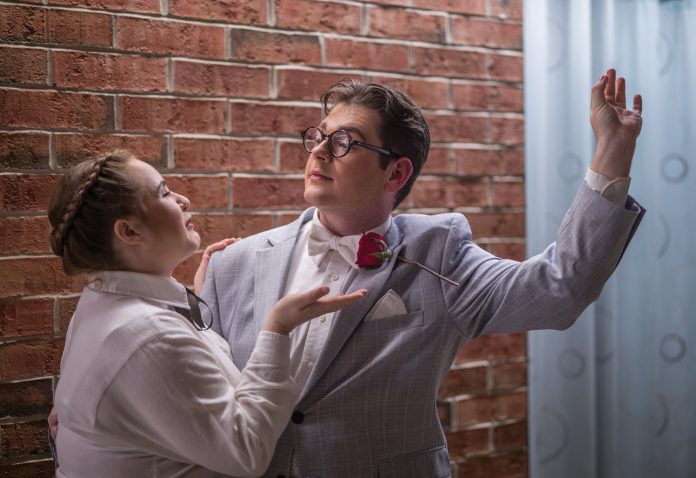

A bumbling love story, a strong name and cucumber sandwiches encompass the comedy that is “The Importance of Being Ernest.” The expertly executed production, taking place on a small swatch of the Moore Theater stage, was a laugh out loud joy to those who saw it over the weekend.
DePauw University’s Theater Department performed this wildly successful play by Oscar Wilde, directed by Professor Susan Anthony. The play brings what is considered the “greatest English stage comedy of all time” to life, as stated on DePauw University’s website.
The story follows Jack Worthing (first-year Graham Votaw) and Algernon Moncrieff (senior Drew Smith) in the 1920’s. After the two realize that they have both invented alter egos, they both decide to pursue a double life in order to impress their lovers, Gwendolyn Fairfax (sophomore Sophia Hoffman) and Cecily Cardew (junior Maggie Terry).
Entangled in all of this drama is a satirical comedy that makes commentary on upper-class social expectations. The subtitle itself, “A Trivial Comedy for Serious People” is a jab at the stereotypical upper class who would have taken the play seriously.
The play’s use of satire and irony are incredibly impactful and are responsible for the play’s popularity. The infamous Lady Bracknell (communications professor, Andrew Hayes) is a good example of the play’s farcical comedy. She doesn’t want her daughter, Gwendolyn to marry Ernest because of his background, though is fine with her nephew Algernon marrying Cecily despite his assumption of an alter ego.
This type of sophisticated commentary is translated into comedy by Oscar Wilde’s brilliant writing and DePauw’s proficient cast. Wilde’s use of irony is perfectly executed by the cast, demanding the audience’s attention and awareness for the entirety of the play. The name of Ernest itself is ironic. Ernest, the fake persona, is described as extremely attractive, and both Gwendolyn and Cecily long for him. Despite this trickery, the term "earnest" actually means sincere, a rare trait for the characters of Wilde's play.
As far as acting, each actor seemed dedicated to accurately portraying the parodic characters they were tasked with playing. Votaw was especially convincing in the way he delivered the witty, sophisticated, and satirical words of Oscar Wilde.
The set design was also remarkable. The use of a projector to cast the background was an interesting technique that served well. The cast was well-prepared to take on such a complicated and in-depth story, and they did not disappoint. One cannot write a review of the play without also mentioning the notorious Lady Bracknell, mother of Gwendolyn and aunt of Algeron played with perfect comedic timing by Hayes.
The most important aspect of the play is its commentary on the upper class and social expectations. Written during the Victorian Era, it is no surprise that Wilde was fed up with all of the hypocrisy coming from the upper class. This frustration is clearly received through the play’s portrayal of the rich. The play’s brilliant writing and demand for perfection from cast members is what has made it what it is today.
Overall, the theater department certainly put on a spectacle for DePauw students have laughed, and to also examine the constraints and the expectations put forth on our society when it comes to anything from class to gender.
